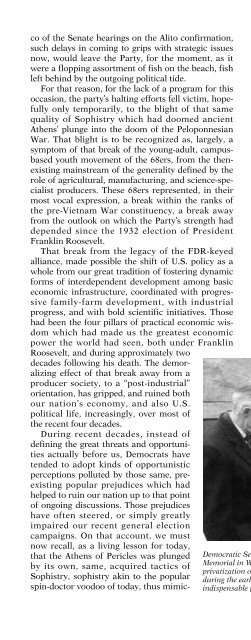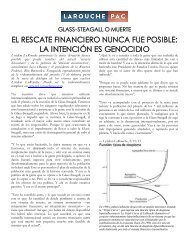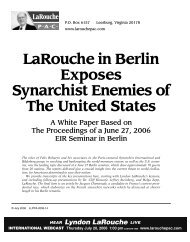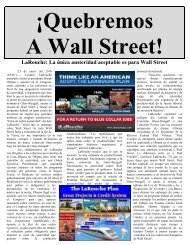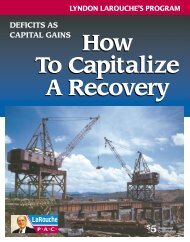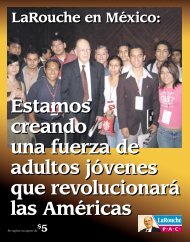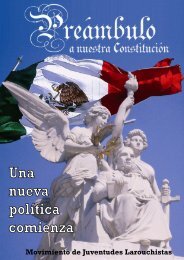Franklin Roosevelt's Legacy Franklin Roosevelt's Legacy
Franklin Roosevelt's Legacy Franklin Roosevelt's Legacy
Franklin Roosevelt's Legacy Franklin Roosevelt's Legacy
You also want an ePaper? Increase the reach of your titles
YUMPU automatically turns print PDFs into web optimized ePapers that Google loves.
co of the Senate hearings on the Alito confirmation,<br />
such delays in coming to grips with strategic issues<br />
now, would leave the Party, for the moment, as it<br />
were a flopping assortment of fish on the beach, fish<br />
left behind by the outgoing political tide.<br />
For that reason, for the lack of a program for this<br />
occasion, the party’s halting efforts fell victim, hopefully<br />
only temporarily, to the blight of that same<br />
quality of Sophistry which had doomed ancient<br />
Athens’ plunge into the doom of the Peloponnesian<br />
War. That blight is to be recognized as, largely, a<br />
symptom of that break of the young-adult, campusbased<br />
youth movement of the 68ers, from the thenexisting<br />
mainstream of the generality defined by the<br />
role of agricultural, manufacturing, and science-specialist<br />
producers. These 68ers represented, in their<br />
most vocal expression, a break within the ranks of<br />
the pre-Vietnam War constituency, a break away<br />
from the outlook on which the Party’s strength had<br />
depended since the 1932 election of President<br />
<strong>Franklin</strong> Roosevelt.<br />
That break from the legacy of the FDR-keyed<br />
alliance, made possible the shift of U.S. policy as a<br />
whole from our great tradition of fostering dynamic<br />
forms of interdependent development among basic<br />
economic infrastructure, coordinated with progressive<br />
family-farm development, with industrial<br />
progress, and with bold scientific initiatives. Those<br />
had been the four pillars of practical economic wisdom<br />
which had made us the greatest economic<br />
power the world had seen, both under <strong>Franklin</strong><br />
Roosevelt, and during approximately two<br />
decades following his death. The demoralizing<br />
effect of that break away from a<br />
producer society, to a “post-industrial”<br />
orientation, has gripped, and ruined both<br />
our nation’s economy, and also U.S.<br />
political life, increasingly, over most of<br />
the recent four decades.<br />
During recent decades, instead of<br />
defining the great threats and opportunities<br />
actually before us, Democrats have<br />
tended to adopt kinds of opportunistic<br />
perceptions polluted by those same, preexisting<br />
popular prejudices which had<br />
helped to ruin our nation up to that point<br />
of ongoing discussions. Those prejudices<br />
have often steered, or simply greatly<br />
impaired our recent general election<br />
campaigns. On that account, we must<br />
now recall, as a living lesson for today,<br />
that the Athens of Pericles was plunged<br />
by its own, same, acquired tactics of<br />
Sophistry, sophistry akin to the popular<br />
spin-doctor voodoo of today, thus mimicking<br />
what became the doom of the Greece of that<br />
earlier time.<br />
Nonetheless, much of the leadership of the Party<br />
had enjoyed increasingly fruitful collaboration during<br />
the late Summer and Autumn of 2004, and in<br />
deliberations on the policy for the past first year of<br />
the second term of President George W. Bush, Jr.<br />
The vitality of those efforts of 2005 was weakened<br />
during the early weeks of 2006. So, the perspective<br />
which had been associated with the Democratic<br />
leadership of the Senate and House of<br />
Representatives during 2005, waned during the early<br />
weeks of 2006. It is clear that without an appropriate,<br />
soundly premised statement of a clear programmatic<br />
perspective now, the Party would not be able<br />
to recover the vitality it had manifest over the course<br />
of 2005.<br />
Since the most crucial of the strategic economic<br />
domestic and global issues of 2006-2008 are of types<br />
which fit the nature of my special expertise, it is<br />
clearly my personal obligation to provide the Party<br />
with the clear strategic perspective whose crafting<br />
depends to a crucial degree on the technical competence<br />
of my special competencies in matters which<br />
are now of currently crucial importance. Thus, it is<br />
my duty to craft the needed programmatic perspective<br />
for 2006-2008, as I do in the body of this report.<br />
The Role of Political Leadership<br />
We should recall a certain charming anecdote<br />
from a past century. This referred to one of many<br />
murray.senate.gov<br />
Democratic Senators gave a press conference at the <strong>Franklin</strong> D. Roosevelt<br />
Memorial in Washington, Feb. 3, 2005, during the fight to prevent the<br />
privatization of Social Security. The vitality of those efforts was weakened<br />
during the early weeks of 2006. A clear programmatic perspective is<br />
indispensable for the Party to recover its vitality.<br />
3


